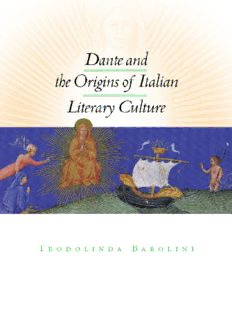
Dante and the origins of Italian literary culture PDF
Preview Dante and the origins of Italian literary culture
D A N T E A N D T H E O R I G I N S O F I T A L I A N L I T E R A R Y C U L T U R E .................16121$ $$FM 09-25-0612:05:36 PS PAGEi .................16121$ $$FM 09-25-0612:05:36 PS PAGEii DANTE AND THE ORIGINS OF ITALIAN LITERARY CULTURE teodolinda barolini ❁ 2006 Fordham University Press, New York, .................16121$ $$FM 09-25-0612:05:37 PS PAGEiii Copyright(cid:2)2006FordhamUniversityPress Allrightsreserved.Nopartofthispublicationmaybereproduced,storedina retrievalsystem,ortransmittedinanyformorbyanymeans—electronic, mechanical,photocopy,recording,oranyother—exceptforbriefquotationsin printedreviews,withoutthepriorpermissionofthepublisher. LibraryofCongressCataloging-in-PublicationData Barolini,Teodolinda,1951– DanteandtheoriginsofItalianliteraryculture/TeodolindaBarolini.—1sted. p. cm. Includesbibliographicalreferencesandindex. ISBN-13:978-0-8232-2703-7(cloth:alk.paper) ISBN-10:0-8232-2703-0(cloth:alk.paper) ISBN-13:978-0-8232-2704-4(pbk.:alk.paper) ISBN-10:0-8232-2704-9(pbk.:alk.paper) 1. DanteAlighieri,1265–1321—Influence—Italy. 2. Italianliterature—History andcriticism. I. Title. PQ4381.2.B37 2006 851(cid:2).1—dc22 2006029447 PrintedintheUnitedStatesofAmerica 08 07 06 5 4 3 2 1 Firstedition .................16121$ $$FM 09-25-0612:05:37 PS PAGEiv ❁ This book is dedicated with much love to the woman who taught me to read, my mother, Helen Barolini, The Original Reader Against the Grain .................16121$ $$FM 09-25-0612:05:37 PS PAGEv .................16121$ $$FM 09-25-0612:05:37 PS PAGEvi Contents Introduction ReadingAgainsttheGrain:MusingsofanItalianist, fromtheAstraltotheArtisanal 1 i. a philosophy of desire 1. DanteandtheLyricPast 23 2. Guittone’sOraparra`,Dante’sDogliamireca, andtheCommedia’sAnatomyofDesire 47 3. DanteandCavalcanti(OnMakingDistinctionsinMattersofLove): Inferno5inItsLyricandAutobiographicalContext 70 4. MedievalMulticulturalismandDante’sTheologyofHell 102 ii. christian and pagan intertexts 5. WhyDidDanteWritetheCommedia? DanteandtheVisionaryTradition 125 6. Minos’sTail:TheLaborofDevisingHell (Aeneid6.431–33andInferno5.1–24) 132 7. Q:DoesDanteHopeforVergil’sSalvation? A:WhyDoWeCare?FortheVeryReason WeShouldNotAsktheQuestion 151 8. Arachne,Argus,andSt.John:Transgressive ArtinDanteandOvid 158 iii. ordering the macrotext: time and narrative 9. Cominciandomidalprincipioinfinoalafine: ForgingAnti-narrativeintheVitanuova 175 .................16121$ CNTS 09-25-0612:05:39 PS PAGEvii Contents viii 10. TheMakingofaLyricSequence:TimeandNarrative inPetrarch’sRerumvulgariumfragmenta 193 11. TheWheeloftheDecameron 224 12. EditingDante’sRimeandItalianCulturalHistory:Dante,Boccaccio, Petrarca...Barbi,Contini,Foster-Boyde,DeRobertis 245 iv. gender 13. Leparolesonfemmineeifattisonmaschi:TowardaSexualPoeticsof theDecameron(Decameron2.9,2.10,5.10) 281 14. DanteandFrancescadaRimini:Realpolitik,Romance,and Gender 304 15. Sottobenda:GenderintheLyricsofDanteandGuittoned’Arezzo (WithaBriefExcursusonCeccod’Ascoli) 333 16. NotestowardaGenderedHistoryofItalianLiterature,witha DiscussionofDante’sBeatrixLoquax 360 Notes 379 Index 467 .................16121$ CNTS 09-25-0612:05:39 PS PAGEviii Introduction Reading Against the Grain: Musings of an Italianist, from the Astral to the Artisanal O ne of the great pleasures of gathering my essays is the opportu- nity afforded, by looking back, to chart the maze and find its princi- ples of order. The pillars of my critical praxis stand clear in the light ofretrospection.Oneistheimportanceoflearningfromthereception, frequentlywiththegoalofdemystifyinganddeinstitutionalizingview- points that have been given too much credence and authoritative weight by centuries of repetition. Perhaps this attitude was born in response to working on a text, Dante’s Commedia, which has pro- duced masses of repetitive exegesis since the fourteenth century, and in the context of a culture—Italian—that invests excessively in the authority of tradition and indeed in the authority of authority itself. As a young scholar I conceived it my duty to learn what had been written,towadethroughmanycommentariesandlecturae.Ultimately I learned not only to value the rare acuity of the fourteenth-century commentator Benvenuto da Imola or the acerbic wit of Ludovico Castelvetro in the sixteenth century but also how to learn from even the most repetitive and least original contributions—which involved less attention to the content of what was said, which had usually been said before, than to the fact of these commentaries’ existence. This authority-laden exegetical tradition taught me that a poet who takes God as his guarantor,like the poet of the Commedia,could generate a commentary tradition, and then exert a pull on his commentators not so dissimilar from that of the Bible. I responded by wanting to study and understand the modalities of how Dante went about constructing an authorial voice that could exert such control, a response that took me first in the direction of intertextuality in Dante’s Poets: Textuality and Truth in the ‘‘Comedy’’ and then of narrative theory in The Undi- vine Comedy: Detheologizing Dante.1 .................16121$ INTR 09-25-0612:05:42 PS PAGE1
Description: